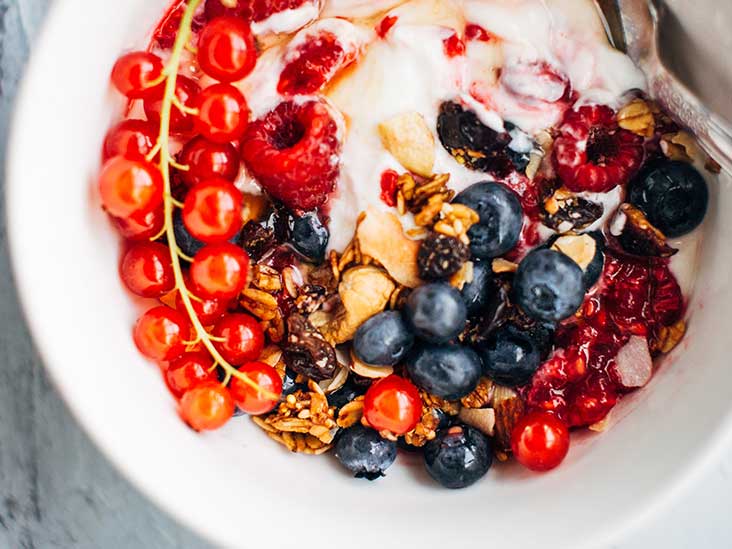Probiotics are ideal for caring for and protecting health, as they provide incredible health benefits. Therefore, it is useful to discover when it is appropriate to take them and which foods are the richest in probiotic qualities

Although it is possible to confuse them, and there are even many people who tend to think that they are the same, the truth is that it is necessary to know what the differences are between prebiotics and probiotics to discover that, in reality, their benefits, properties and functions main are very different. And it is that we must not only take into account that, each of them, come from different food sources, but that their functions in the body tend not to be the same.
In the particular case of those known as prebiotics, they consist of substances that act as food for the beneficial bacteria that we find especially in the colon, so that they help in a very positive way when it comes to maintaining good health of the intestinal flora. But, in the case of probiotics, what are they and what do they consist of?
What are probiotics?
Probiotics are characterized by being living microorganisms (especially bacteria or yeasts), which help to increase, maintain and improve the intestinal flora. This is composed of microorganisms that feed on the fiber that we consume from our diet.
They are essential bacteria, since an imbalance can cause alterations in our health. If you want to know more, discover how to take care of the intestinal flora with some natural tips and tricks.
In this sense, the lactobacilluscasei, the lactobacillus acidofillus and the lactobacillus rhamnosus stand out, which according to the different scientific studies that have been carried out to analyze their benefits, have turned out to be the most interesting.
These microorganisms are able to cross the gastric barrier, and settle in the colon, where they multiply and colonize the intestinal mucus, where they perform their important functions for our health.
Probiotics and health: benefits and virtues
The probiotics are live microorganisms that, in sufficient quantity ingested, are very beneficial for the body to help regulate the intestinal transit.
In this regard, and to give just one example, bifidobacteria are a type of probiotics that we find mainly in fermented dairy products.
Regarding their health effects, probiotics are suitable for improving intestinal transit function and its own regulation, helping in heavy digestion, preventing constipation and treating abdominal bloating.
Most important functions of probiotics
Probiotics are essential for our health, and essential within a healthy, varied and balanced diet, since they carry out the following basic functions, providing us with the benefits that we indicate below:
- They stimulate the production of antibodies: there is no doubt that probiotics are very beneficial for our defenses, since they help to strengthen the immune system. In this sense, they act to reduce infections caused by the ingestion of pathogenic elements.
- Good for the intestine: they help reduce inflammatory disorders that affect the intestine. They are also useful in case of diarrhea, used in treatments against diarrhea.
- Ideal against abdominal bloating: being beneficial for the body by helping to regulate intestinal transit, the consumption of both fermented milk and probiotic products themselves can be ideal to improve the feeling of abdominal bloating, and with it the quality of life itself of the people who take them.
- They improve digestive function: helping, for example, to assimilate essential nutrients as important as amino acids.
- Essential for the synthesis of vitamins: especially in the synthesis of group B vitamins.
- Beneficial against intolerances and allergies: Some scientific studies have shown that probiotics are helpful in reducing both food allergies and lactose intolerance.
- Producers of antimicrobial acids: These acids prevent pathogens from proliferating.
What are the foods richest in probiotics?
If you want to include probiotic foods in your daily diet, the most interesting are: yogurt, kefir, brewer’s yeast, miso and tempeh.
While both yogurt and kefir can be found in the supermarket, brewer’s yeast, tempeh and miso can be found in herbalists and specialized diet stores (although in some cases it is also possible to buy them in supermarkets).
If you want to know more about probiotic foods, we encourage you to read the following articles:
- Benefits and properties of kefir, a unique natural probiotic
- Benefits and properties of yogurt
- Why is it good to have brewer’s yeast every morning
- Tempeh: what it is, properties, uses and recipes
- How to make a wonderful miso soup: traditional Japanese soup
You can find them in herbalists and hypermarkets, and their cost can be affordable depending on the brand chosen.
When to take probiotic foods?
Fundamentally the consumption of probiotic foods is recommended when there is an imbalance in the intestinal flora, which tends to be easily unbalanced after taking antibiotics. Although it is advisable to start with the consumption of probiotics after finishing the treatment, in case of having to take antibiotics for more than 2 weeks it is interesting to take them at the same time.
However, as a general rule, probiotic foods are recommended in the following conditions or conditions:
- Inflammatory bowel diseases (not ulcerative) : irritable bowel syndrome (also popularly known as irritable bowel), Crohn’s disease …
- Low immune system, with increased susceptibility to infection.
- Constipation.
- Gases.
- High cholesterol levels.
- Skin disorders: acne, psoriasis, and eczema.
- Vaginal yeast infection.
- Allergies.
- Urinary tract infections.
In any case, despite the fact that probiotic foods are healthy, prolonged consumption of these foods, longer than a month, is not recommended, especially in children under 14 years of age without the supervision of a professional.































